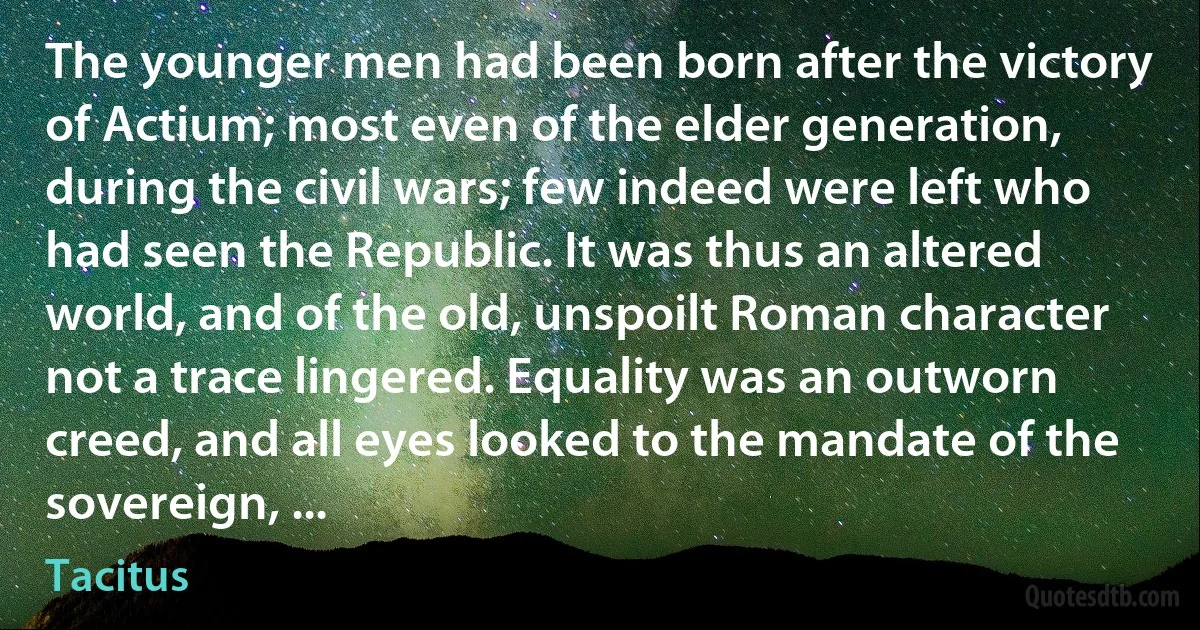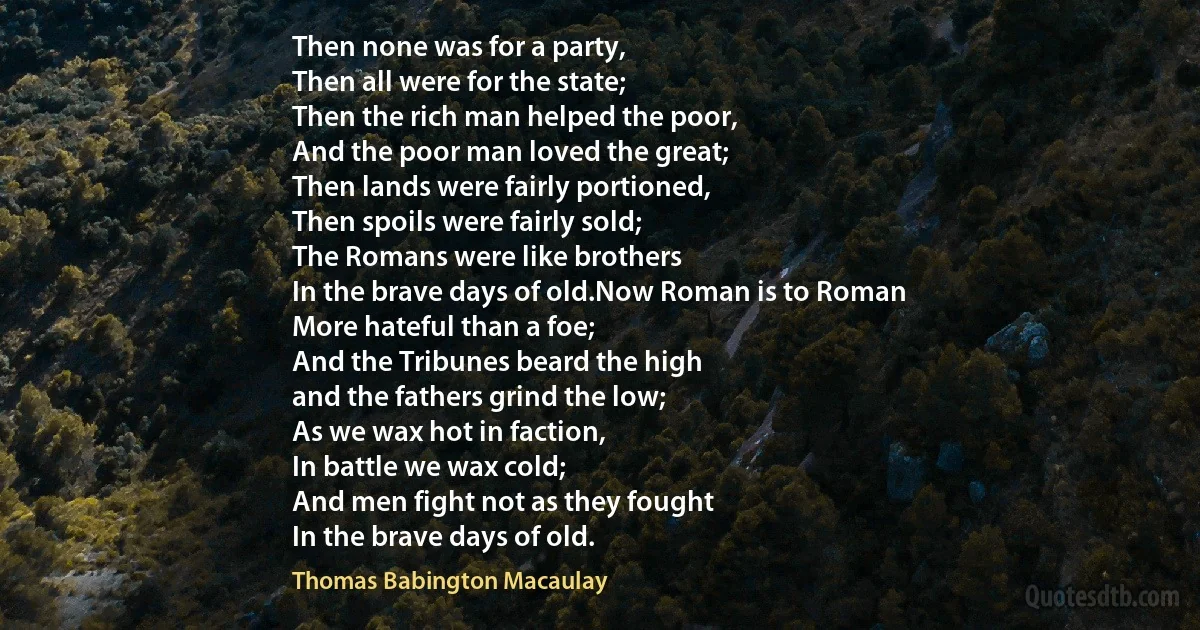Roman Quotes - page 18
The RKM professes a syncretism, combining elements from different religions. Ramakrishnaism is the syncretism par excellence, affirming "all” religions to be true. As the Church Fathers wrote, syncretism is typical of Paganism. The Roman-Hellenistic milieu in which the first Christians had to function, was full of syncreticism, with Roman matrons worshipping Isis with the babe Horus (an inspiration for the image of Mary holding the babe Jesus), legion soldiers worshipping Persian-originated Mithras, and imperial politicians worshipping the Syrian-originated Sol Invictus... Against this syncretism, they preached religious purity: extra ecclesiam nulla salus, outside the Church no salvation. They had no problem admitting that Paganism was naturally pluralistic, but what is the use of choosing between or combining different kinds of falsehood?

Koenraad Elst
In most poetic expressions of patriotism, it is impossible to distinguish what is one of the greatest human virtues from the worst human vice, collective egotism.
The virtue of patriotism has been extolled most loudly and publicly by nations that are in the process of conquering others, by the Roman, for example, in the first century B.C., the French in the 1790s, the English in the nineteenth century, and the Germans in the first half of the twentieth. To such people, love of one's country involves denying the right of others, of the Gauls, the Italians, the Indians, the Poles, to love theirs.

W. H. Auden
Any public committee man who tries to pack the moral cards in the interest of his own notions is guilty of corruption and impertinence. The business of a public library is not to supply the public with the books the committee thinks good for the public, but to supply the public with the books the public wants. ... Censorship ends in logical completeness when nobody is allowed to read any books except the books that nobody can read. But as the ratepayer is mostly a coward and a fool in these difficult matters, and the committee is quite sure that it can succeed where the Roman Catholic Church has made its index expurgatorius the laughing-stock of the world, censorship will rage until it reduces itself to absurdity; and even then the best books will be in danger still.

George Bernard Shaw
It is not then from the alienated affections of Ireland or America, that you [George III] can reasonably look for assistance; still less from the people of England, who are actually contending for their rights, and in this great question, are parties against you. You are not however, destitute of every appearance of support: you have all the Jacobites, Non-jurors, Roman Catholics, and Tories of this country, and all Scotland, without exception. Considering from what family you are descended, the choice of your friends has been singularly directed; and truly, Sir, if you had not lost the Whig interest of England, I should admire your dexterity in turning the hearts of your enemies.

Junius
My voice is still for war.
Gods! Can a Roman senate long debate
Which of the two to choose, slavery or death?
No, let us rise at once,
Gird on our swords, and,
At the head of our remaining troops, attack the foe,
Break through the thick array of his throng'd legions,
And charge home upon him.
Perhaps some arm, more lucky than the rest,
May reach his heart, and free the world from bondage.

Joseph Addison
Substitute Tully and Demosthenes in the place of Homer and Virgil; and arm yourself with all the variety of manner, copiousness and beauty of diction, nobleness and magnificence of ideas of the Roman consul; and render the powers of eloquence complete by the irresistible torrent of vehement argumentation, and close and forcible reasoning, and the depth and fortitude of mind of the Grecian statesman.

William Pitt, 1st Earl of Chatham
Raised as a Roman Catholic, I internalized the social values of that faith and still hold most of them, even though its theology no longer persuades me. I have no quarrel with what anyone else subscribes to; everyone deals with these things in his own way, and I have no truths to impart. All I require of a religion is that it be tolerant of those who do not agree with it. I know a priest whose eyes twinkle when he says, "You go about God's work in your way, and I'll go about it in His.”.

Roger Ebert
Until you have lost a child, you don't know what it is. Parents are supposed to die first. When your child is gone before you for an abnormal reason, it creates a whole abnormal situation... It was three years before I could even... I couldn't even look at Roman. Because, you see, I still expected Sharon to be with him, so I was playing games in my mind... Roman really loved Sharon, I know that, and he was very, very grieved.

Sharon Tate
The party of reform emerges, as it were, personified in Marcus Porcius Cato (520-605). Cato, the last statesman of note belonging to that earlier system which restricted its ideas to Italy and was averse to universal empire, was for that reason accounted in after times the model of a genuine Roman of the antique stamp; he may with greater justice be regarded as the representative of the opposition of the Roman middle class to the new Hellenico-cosmopolite nobility. Brought up at the plough, he was induced to enter on a political career by the.

Theodor Mommsen
The idea that feminism is the first group that has ever denounced rape is a gross libel to men. Throughout history, rape has been condemned by honorable men. Honorable men do not murder; honorable men do not steal; honorable men do not rape. It goes all the way back through history. Tarquin's rape of Lucretia caused the fall of the tyrants and the beginning of the Roman Republic. The idea that somehow suddenly feminism miraculously found out that women were being exploited and raped throughout history is ridiculous.

Camille Paglia
Isolated here in the North, planted long ago by a Roman pilgrim, a chestnut grew, strong and solitary, by the colonnade of rounded double arches at the entrance to the cloister of Mariabronn: a noble, vigorous tree, the sweep of its foliage drooping tenderly, facing the winds in bold and quiet assurance; so tardy in spring that when all glowed green around it and even the cloister nut trees wore their russet, it awaited the shortest nights to thrust forth, through little tufts of leaves, the dim exotic rays of its blossom, and in October, after wine and harvests had long been gathered, let drop the prickly fruits from its yellowing crown... The lovely tree, aloof and tender, shadowed the entrance to the cloister, a delicate, shuddering guest from a warmer clime, secretly akin to the slender double columns of the gateway, the pillars and mouldings of the window arches, loved by all Latins and Italians, gaped at, as a stranger, by the inhabitants. Ch. I.

Hermann Hesse
We must face unconsidered possibilities and ask ourselves alarming questions–for instance, must we perhaps let the self-destroyer go if he really wants to? Trying to answer this by collecting information about our own neurones would be no more use than doing it, like the Roman augur, by inspecting the entrails of a goat.

Mary Midgley
[The lawless men of Acts 2:23 who nailed Jesus to the cross and killed Him include] Judas Iscariot, chief priests, officers of the temple, elders, the high priest and Jewish Sanhedrin, Pilate, Herod, and the Roman soldiers – mainly the Jewish religionists with their deputies and the Gentile politicians with their subordinates. This indicates that Jesus was killed by all mankind.

Jesus Christ
The man who works, the man who does great deeds, in the end dies as surely as the veriest idler who cumbers the earth's surface; but he leaves behind him the great fact that he has done his work well. So it is with nations. While the nation that has dared to be great, that has had the will and the power to change the destiny of the ages, in the end must die, yet no less surely the nation that has played the part of the weakling must also die; and whereas the nation that has done nothing leaves nothing behind it, the nation that has done a great work really continues, though in changed form, to live forevermore. The Roman has passed away exactly as all the nations of antiquity which did not expand when he expanded have passed away; but their very memory has vanished, while he himself is still a living force throughout the wide world in our entire civilization of today, and will so continue through countless generations, through untold ages.

Theodore Roosevelt
With the present importance of the city [of Rome] and the unlimited numbers of its population, it is necessary to increase the number of dwelling-places indefinitely. Consequently, as the ground floors could not admit of so great a number living in the city, the nature of the case has made it necessary to find relief by making the buildings high. In these tall piles reared with piers of stone, walls of burnt brick, and partitions of rubble work, and provided with floor after floor, the upper stories can be partitioned off into rooms to very great advantage. The accommodations within the city walls being thus multiplied as a result of the many floors high in the air, the Roman people easily find excellent places in which to live.

Vitruvius



